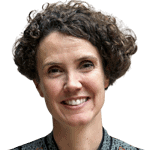Geopolitical circumstances have put energy poverty high on the agenda within the European Union. One in every four Europeans is affected by energy poverty.
Yet women are more affected still, linked to the division of labour between men and women. Women in the EU bear the brunt of care work: on average, they spend two-and-a-half times as many hours as men on care responsibilities. And spending more time working at home renders them more susceptible to the adverse effects of energy poverty.
The unshared burden of care is also the root cause of gender inequalities in pay and, later, in pensions, which contributes to energy poverty in old age. Continuing fossil-fuel dependency, indecent housing and structural inequalities all play their roles too.
The repercussions of gender poverty are physiological and health-related as well as economic and social. Due to factors such as age and physical constitution, women face unique physiological challenges. That women’s energy needs and consumption patterns differ from those of men clearly connects gender and energy poverty. The economic disparities exemplified by the gender pay and pension gaps compound the issue.
An ‘intersectional’ approach is thus required to understand the underlying determinants of energy poverty. This is essential if the European Green Deal is to live up to its promise of transformative change.
Multifaceted approach
Lessons can be learned from an EU Horizon project which ran from 2019 to 2023, addressing energy poverty with a focus on women. EmpowerMed took a multifaceted approach to the struggles faced by households in the Mediterranean, in particular related to summer energy poverty. Its three primary activities showed how real change comes.
Practical solutions for real impact: EmpowerMed implemented tailored solutions to empower households grappling with energy poverty, such as new LED lighting fixtures or installation of smart meters. The project worked with Collective Advisory Assemblies (CAAs), which proved a flexible and effective tool to address the various forms and levels of energy poverty.
Their public sessions, involving 10 to 30 participants, provided a safe space for individuals facing challenges related to domestic energy services. High energy bills, inappropriate tariffs, late payments, provider debt and health concerns were openly discussed, leading to solutions through collaborative collective intelligence.
The CAAs fostered community engagement, allowing groups with similar energy-poverty experiences to share concerns and grievances. From innovative technologies to community-driven initiatives, the solutions emerging aimed to make a tangible difference to the lives of those affected.
Assessing efficiency and effectiveness: Rigorous assessments were conducted to evaluate the adequacy of the various measures adopted to alleviate energy poverty. This step was crucial to understanding what worked and why, paving the way for future endeavours.
Advocating for policy solutions: EmpowerMed did not stop at practical actions. The project actively engaged in promoting policy solutions at local, national and EU levels. It thus aimed to address the root causes of energy poverty, promoting lasting change.
Disaggregated data
In the quest for solutions, EmpowerMed unearthed critical insights, leading to actionable recommendations for a more just and equitable energy landscape.
First, awareness needs to be raised and data disaggregated for an intersectional grasp. Energy poverty is caused by indecent housing (bad insulation, old building stock), fossil-fuel dependency and systemic inequalities, which affect most female-led households. It is therefore crucial to include gender as a cross-cutting issue when tackling energy poverty and to raise awareness about the intersection between the two.
Understanding that relationship itself depends on having nuanced data capturing the intricate realities. In practice, that means measures to tackle energy poverty can only be effective when they are based on gender-disaggregated data. These should be collected annually, address cooling as well as heating and harmonise measurement across the union, such as via Eurostat.
Targeting women
Secondly, policy design and implementation need to be gender-transformative. Recognising the diverse needs and experiences of all genders and social groups ensures that policies are not only gender-sensitive but can actively guarantee the human right to clean and affordable energy for all. This means specific programmes, targeting women with concrete measures, such as the health impacts of energy poverty and its summer manifestations.
A pan-European and cross-sectoral strategy is needed. The EU can act as a role model, with its experience in communication, gender-related training, impact assessment, gender budgeting and programmes such as Marie Skłodowska-Curie actions.
Such programmes can be enabled in collaboration with the European Commission’s Energy Poverty Advisory Hub, the EU Covenant of Mayors for Climate and Energy and the European Parliament’s Committee on Women’s Rights and Gender Equality (FEMM)—a committee report on energy poverty was adopted by the parliament last week. The commission should establish an advisory board on gender inclusivity and the energy transition, including energy poverty, fostering a gender approach in all policies.
Gender budgeting
Finally, targeted finance is necessary for lasting impact. Financial mechanisms must align with the goals of gender justice. Low-income households specifically face the split-incentive barrier, where tenants lack decision-making power over the energy supply for their flat or house or renovation measures. Nor do loan schemes and market incentives focus on energy-poor households, and certainly not in a gender-just way. Consistent gender budgeting to ensure that funds target especially women in precarious positions, using gender indicators, is imperative to ensure financial support is directed to where it is most needed.
The EmpowerMed project offers a roadmap towards a more inclusive, equitable and empowered future, at the intersection of feminist principles and energy justice. Unravelling the complexities of energy poverty through a gender lens, Women Engage for a Common Future paves the way more broadly for a world where the right to safe and affordable energy becomes a reality for all. WECF’s eco-feminist approach addresses gender equality and women’s human rights in interconnection with climate justice, sustainable energy and chemicals, with less toxic waste, safe water and sanitation for all.
Dr Anke Stock is a lawyer and board member of Women Engage for a Common Future and the European Environmental Bureau. She is an expert on gender issues in sustainable development.

